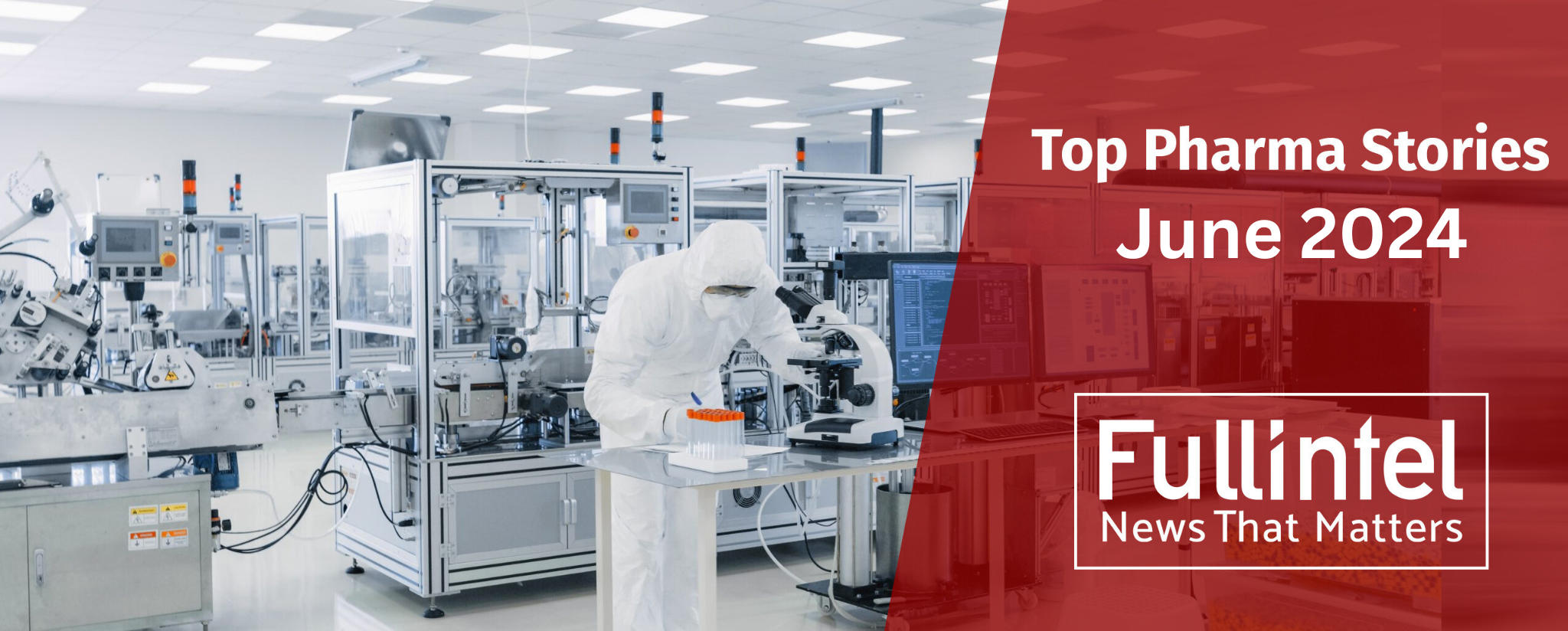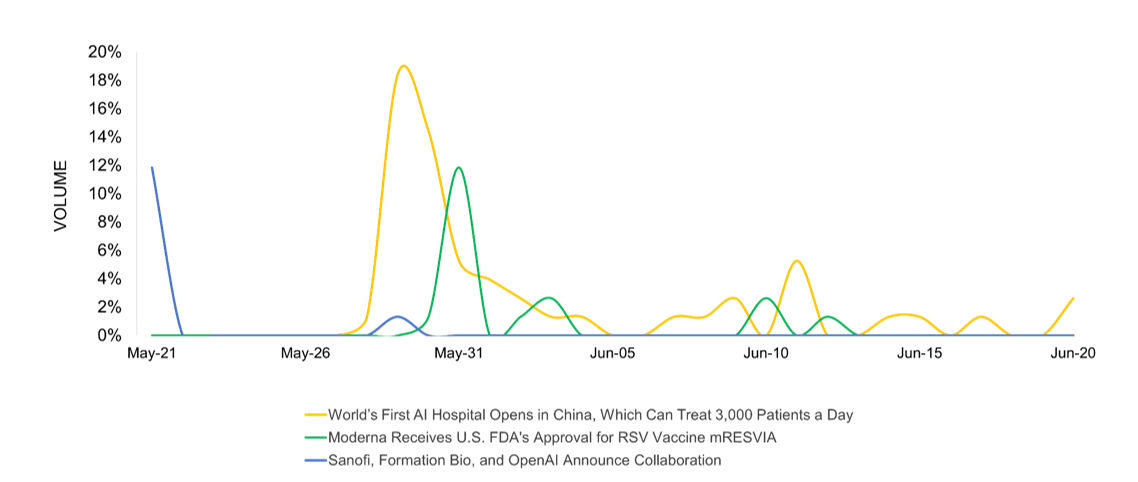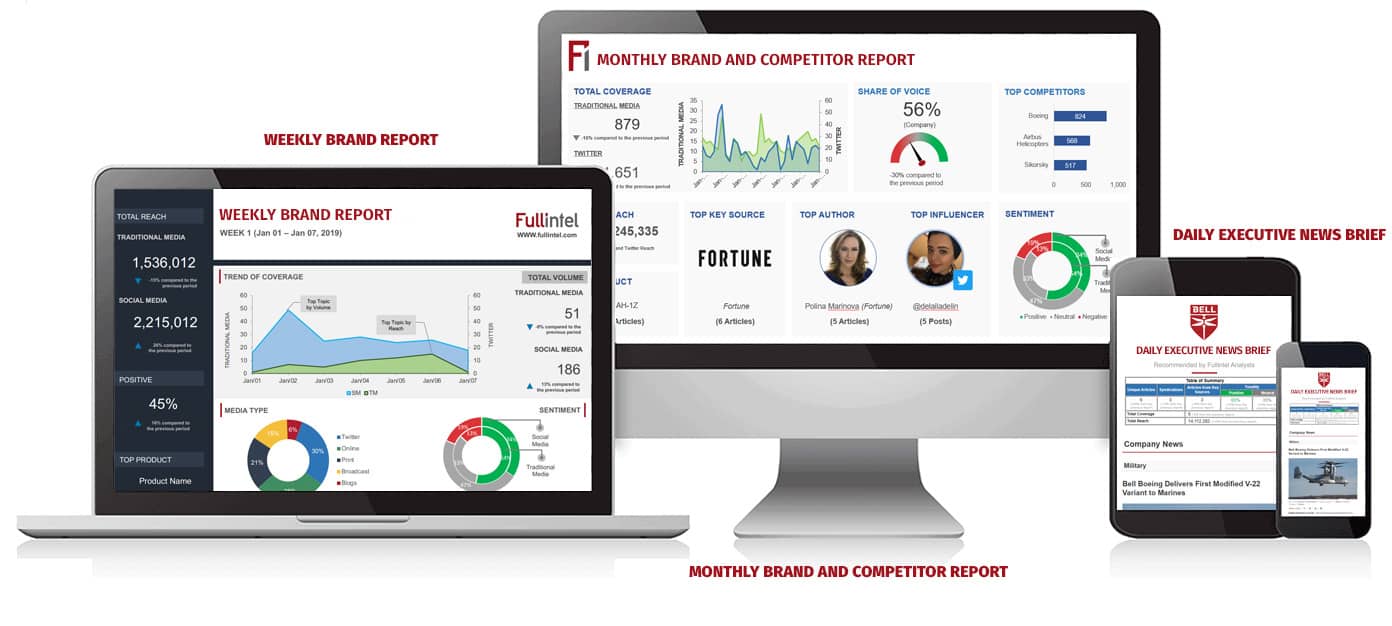
In this edition of our pharma newsletter, we explore advancements transforming the healthcare and pharmaceutical landscape. From government initiatives aimed at improving drug affordability and accessibility to technological innovations revolutionizing medical research and patient care, the sector is undergoing rapid changes. These developments provoke a wide range of reactions, from optimism to ethical debates, highlighting the balance between policy and innovation. As we navigate these transformative changes, Fullintel Hub remains a key resource for the latest trends in the pharmaceutical sector, offering concise insights and accessible data to support informed decision-making.
China’s AI Hospital, Moderna’s RSV Vaccine Approval, and Sanofi’s AI Drug Development Partnership with OpenAI and Formation Bio Capture Media Interest in the Pharma Industry

This month’s top trending stories of the pharmaceutical industry include the unveiling of the world’s first AI hospital in China, Moderna’s RSV vaccine receiving the FDA nod, and Sanofi’s breakthrough collaboration with Formation Bio and OpenAI for medical drug discovery.
China’s unveiling of the world’s first AI hospital, capable of treating 3,000 patients daily, highlights AI’s growing role in healthcare, eliciting mixed reactions due to skepticism about its practicality. The story drives coverage in global media outlets, garnering the highest SOV this month. Moderna’s FDA-approved RSV vaccine, mRESVIA, aims to protect older adults from severe RSV infections. The vaccine’s approval, based on positive Phase 3 trial results, receives dominant neutral media coverage but provokes “Angry” social media reactions due to vaccine safety concerns. Sanofi, Formation Bio, and OpenAI’s partnership to create AI-powered software for drug development draws positive responses for its potential health benefits despite some skepticism about AI hype. These developments underscore the transformative impact and challenges of integrating advanced technologies in healthcare and garner the highest social engagement in June.

A Break-Down of Recent Trending Stories:
AI Hospital Unveiling in China Drives Global Media Volume Underscoring Revolutionary Technology
The world’s first AI hospital, unveiled in China, features virtual doctors and nurses capable of treating 3,000 patients daily. Agent Hospital, developed by AI researchers from Tsinghua University in Beijing, aims to revolutionize healthcare by diagnosing diseases, formulating treatment plans, and predicting medical scenarios like pandemics. The AI hospital, operational by late 2024, will initially train real-life doctors and later extend its services to patients across China. The hospital’s “AI doctors” score a high 93.06% accuracy rate on the US Medical Licensing Exam questions underscoring the advanced capabilities of AI in making precise medical diagnoses. This development highlights the growing role of AI in enhancing healthcare delivery and efficiency globally and drives volume across global media. The narrative trends in the last week of May and continues to elicit prominent media attention through June. Garnering “Wow” reactions among the audience, with the “futuristic” use of technology to deliver health services. The audience’s skepticism about the practicality and effectiveness of an AI hospital and concerns about the implications of AI replacing human doctors and nurses, leading to job losses and the dehumanization of healthcare, trigger a “Laugh” reaction.

The FDA’s Approval of Moderna’s RSV Vaccine Engages Audience with Its Wide Neutral Coverage
Moderna’s RSV vaccine, mRESVIA, receives the FDA’s approval to protect adults aged 60 and older from RSV-related lower respiratory tract disease. This is Moderna’s second mRNA product and the only RSV vaccine in pre-filled syringes, as announced proudly by Stéphane Bancel, Chief Executive Officer of Moderna. The approval follows positive Phase 3 trial results published in The New England Journal of Medicine showing an 83.7% efficacy. RSV is a significant health concern for older adults, with approximately 60,000-160,000 hospitalizations and 6,000-10,000 deaths annually in the U.S. This approval is significant as it addresses a major public health threat, offering a new tool to reduce the disease burden among the elderly. The vaccine will be available in the U.S. for the 2024/2025 season, with applications pending in other markets. Announcements of this new drug approval receive dominant neutral coverage in media outlets as part of standard reporting practices, focusing on the facts and implications without hype. A wide spectrum of audience remain skeptical about vaccines in general, leading to anger and distrust whenever a new vaccine is approved. Lingering concerns and misconceptions about the safety and long-term effects of mRNA technology for vaccines might have provoked the unusually high volume of “Angry” social media reactions. The news draws the highest media presence on May 31 through a number of press releases and amasses the second-highest engagement of the month.

Sanofi, Formation Bio, and OpenAI are collaborating to create AI-powered software to accelerate drug development and bring new medicines to patients more efficiently. The partnership will integrate data, software, and tuned models to develop custom solutions across the drug development lifecycle. Sanofi will leverage proprietary data to develop AI models, while OpenAI will provide AI capabilities, including fine-tuning models and deep AI expertise. Formation Bio will contribute extensive engineering resources, experience at the intersection of pharma and AI, and its tech-driven development platform to design, develop, and deploy AI technologies across all aspects of the pharma lifecycle. This collaboration aims to enhance the efficiency and effectiveness of the drug development process. This news receives an entirely positive response from the audience due to its expert collaboration, which is seen as a powerful alliance, increasing confidence in the success of the project. A general sense of cynicism about the hype surrounding AI and past instances where AI initiatives did not deliver on their promises may have spurred a dominant “Laugh” reaction among social media users. However, a good proportion of the audience “loved” this progressive development, which underlines the highly appealing potential health benefit, as it could lead to better health outcomes and improved quality of life. Media outlets picked up this trending news on May 21.


